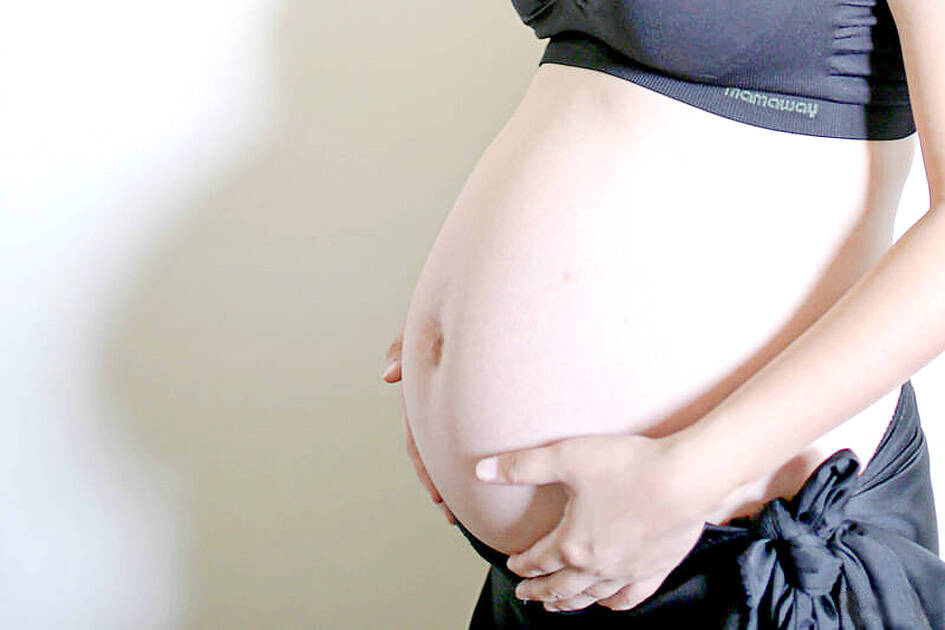Officials are discussing decoupling legal changes related to assisted reproduction from the more controversial issue of surrogacy, the Ministry of Health and Welfare said yesterday, as the government is looking to boost the nation’s flagging birthrate.
The ministry earlier this year announced a draft amendment to the Assisted Reproduction Act (人工生殖法), proposing to legalize assisted reproduction for same-sex couples and unmarried people.
The proposed amendment received much feedback, with significant concerns arising regarding surrogacy, Deputy Minister of Health and Welfare Lin Ching-yi (林靜儀) said in an interview yesterday.

Photo: Taipei Times
Women’s rights and gender advocacy organizations support prioritizing assisted reproduction rights for single women and same-sex female couples first, as these aspects are less controversial.
“Granting access to assisted reproduction technology is a way to support women who cannot find a suitable partner or do not plan to marry a man,” Lin said, adding that the proposed amendment would continue to be discussed.
The current law only permits married heterosexual couples access to assisted reproduction, Taiwanese Society for Reproductive Medicine chairwoman Tsai Ying-mei (蔡英美) said.
“Many women freeze their eggs in their 30s, but they typically wait until about age 40, when married life is more stable, to use them,” Tsai said.
Women’s fertility typically begins to decline after age 30, with ovarian function, egg count and quality, and the likelihood of embryo implantation all decreasing and the risk of pregnancy-related hypertension increasing, Tsai said.
For in vitro fertilization, the success rate is about 44 percent for women aged 35 or younger, 18 percent for women aged 40 or older, and 7.6 percent after age 42, she said.
Married heterosexual couples usually freeze embryos rather than eggs, but as frozen embryos would be destroyed if the couple divorces, some married women still freeze their eggs to hold on to their reproductive autonomy, Tsai said.
On Thursday, National Development Council (NDC) Minister Liu Chin-ching (劉鏡清) told lawmakers that the decline in Taiwan’s birthrate would be difficult to reverse, as is the case in many developed countries.
In his report to the legislature, Liu cited two problems that young Taiwanese face that prevent them from having children: Finding a spouse and caring for their parents.
In Taiwan the vast majority of children are born to married couples (96.25 percent last year), meaning that Taiwanese usually marry before having children, unlike Western societies, he said.
As a result, the government needs to provide greater assistance with childcare, help married couples secure housing earlier or more easily and relieve the burden on young people taking care of their parents, he said.
Over the past 16 years, former presidents Ma Ying-jeou (馬英九) and Tsai Ing-wen (蔡英文) recognized that the population issue was a national security crisis that cannot be solved in a short period, Liu said, responding to lawmakers’ questions about the failure of government policies to boost the birthrate.
The NDC is working to optimize relevant programs, but would require an estimated budget of NT$50 billion (US$1.56 billion) to be effective, he said.
Moreover, for an more comprehensive set of measures, the budget would need to increase to NT$100 billion annually, he added.
However, as there is no fixed budget for NDC programs to increase the birthrate, Liu said he hoped the government would instead draft special budgets.

Japanese footwear brand Onitsuka Tiger today issued a public apology and said it has suspended an employee amid allegations that the staff member discriminated against a Vietnamese customer at its Taipei 101 store. Posting on the social media platform Threads yesterday, a user said that an employee at the store said that “those shoes are very expensive” when her friend, who is a migrant worker from Vietnam, asked for assistance. The employee then ignored her until she asked again, to which she replied: "We don't have a size 37." The post had amassed nearly 26,000 likes and 916 comments as of this

US President Donald Trump said "it’s up to" Chinese President Xi Jinping (習近平) what China does on Taiwan, but that he would be "very unhappy" with a change in the "status quo," the New York Times said in an interview published yesterday. Xi "considers it to be a part of China, and that’s up to him what he’s going to be doing," Trump told the newspaper on Wednesday. "But I’ve expressed to him that I would be very unhappy if he did that, and I don’t think he’ll do that," he added. "I hope he doesn’t do that." Trump made the comments in

Tourism in Kenting fell to a historic low for the second consecutive year last year, impacting hotels and other local businesses that rely on a steady stream of domestic tourists, the latest data showed. A total of 2.139 million tourists visited Kenting last year, down slightly from 2.14 million in 2024, the data showed. The number of tourists who visited the national park on the Hengchun Peninsula peaked in 2015 at 8.37 million people. That number has been below 2.2 million for two years, although there was a spike in October last year due to multiple long weekends. The occupancy rate for hotels

A cold surge advisory was today issued for 18 cities and counties across Taiwan, with temperatures of below 10°C forecast during the day and into tonight, the Central Weather Administration (CWA) said. New Taipei City, Taipei, Taoyuan and Hsinchu, Miaoli and Yilan counties are expected to experience sustained temperatures of 10°C or lower, the CWA said. Temperatures are likely to temporarily drop below 10°C in most other areas, except Taitung, Pingtung, Penghu and Lienchiang (Matsu) counties, CWA data showed. The cold weather is being caused by a strong continental cold air mass, combined with radiative cooling, a process in which heat escapes from